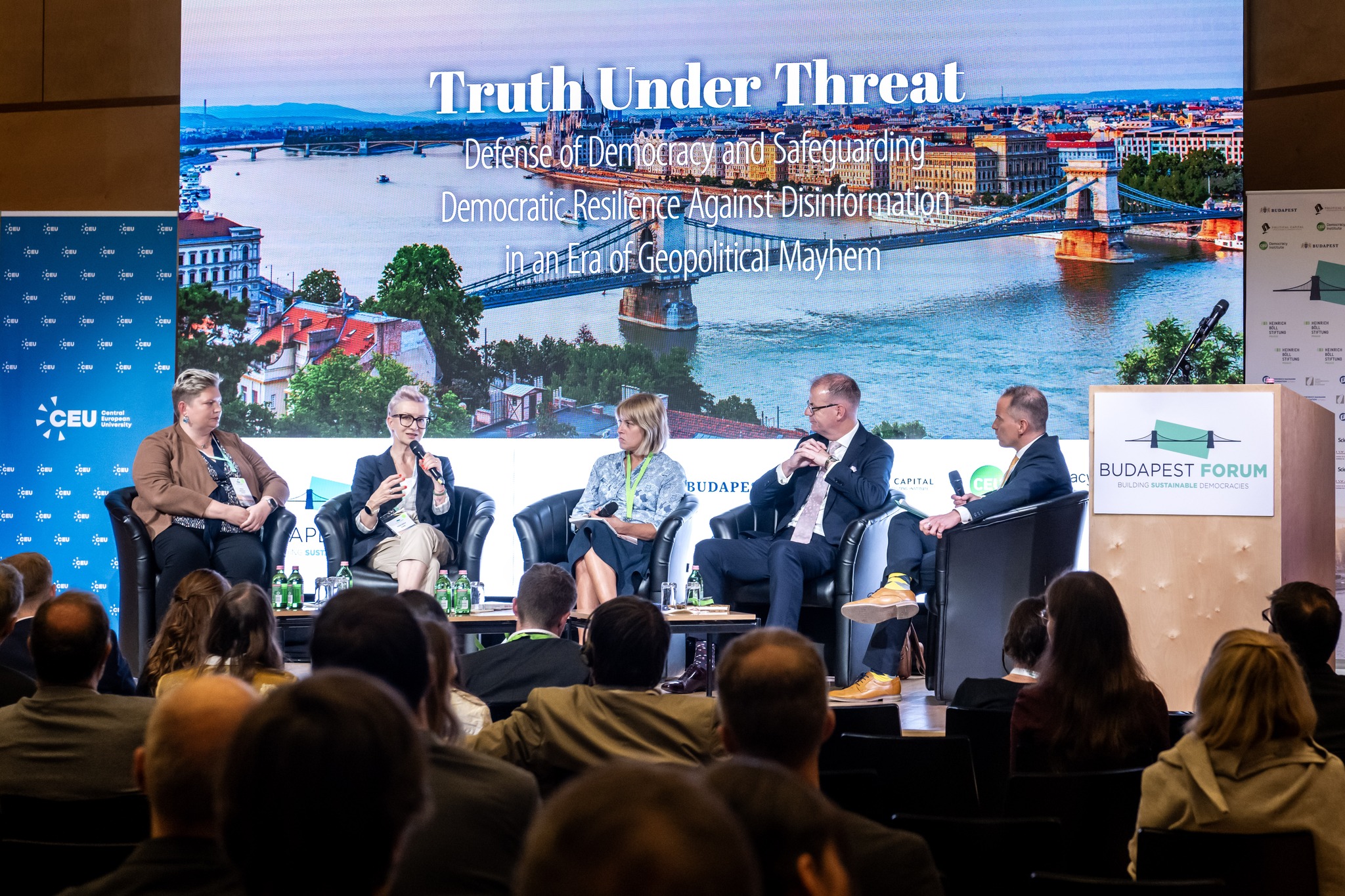Truth under threat: Defense of democracy and safeguarding democratic resilience against disinformation
2025-09-24
Panel summary: ‘Truth under threat: Defense of democracy and safeguarding democratic resilience against disinformation at Budapest Forum 2025.
Participants
Art O’Leary – CEO, Electoral Commission of Ireland
Anett Mádi-Nátor – Cybersecurity expert, Managing Partner, CyEx
Maryia Sadouskaya-Komlach – Global Engagement strategist, Free Press Unlimited / Fellow, Center for European Policy Analysis
Ágnes Urbán – Director, Mertek Media Monitor / Associate Professor, Corvinus University
Moderator: Péter Krekó – Director, Political Capital Institute / Policy Leader Fellow, European University Institute

Main takeaways
- The EU’s new Transparency and Targeting of Political Advertising (TTPA) regulation, effective from 10 October 2025, requires all political messages to carry labels and QR codes showing funding sources, costs, duration, and targeting information. In response, Meta and Google withdrew entirely from the European political advertising space rather than comply, creating significant disturbance for legitimate democratic actors.
- Independent electoral bodies, which heavily relied on online advertising in the past to reach young voters and promote electoral participation, are now being labeled as political actors by platforms and losing access to advertising tools. This has an effect on voter registration encouragement and turnout among demographics that primarily use digital platforms.
- Political actors will be forced to move away from paid, traceable advertising toward organic content creation and viral campaigns. This shift eliminates the transparency that previously existed in paid political advertising and pushes financing and technological means into a rather gray zone that’s harder to monitor and regulate.
- Political actors will be driven to seek unauthorized access to user databases for targeted messaging. The fight for obtaining personal data through cyber attacks is likely to intensify significantly, moving from an already absolutely severe situation to an even worse.
- Independent media outlets, which use advertising to reach beyond political bubbles and discuss issues like climate change and women’s rights, have already faced content rejection for being considered political and the new regulation will just make it even harder for them to prove their non-political status and maintain audience reach.
- The EU’s transparency requirements for political advertising could be copied by authoritarian regimes worldwide, such as Nicaragua and Russia. It could function as a model for implementing foreign agent laws and other restrictive measures justified by just following the European example.
- There are some positive results, Ireland's Electoral Commission engaged directly with major platforms, such as Meta, Google, X, and TikTok, through collaborative rather than adversarial approaches. They developed a voluntary framework covering advertising transparency, AI deepfakes, and misinformation that all platforms agreed to implement within two weeks, bypassing lengthy legal processes.
- English-speaking markets and larger economies are more appealing to platforms when it comes to investing, since they are more likely to have sufficient resources and technical capabilities. Accordingly, smaller, non-English speaking countries face disadvantages in securing cooperation due to limited AI moderation capabilities and lower market priority.
- Traditional social media platforms are falling behind AI agents when it comes to what young people use for information. Adversarial actors are creating numerous low-follower accounts and web pages specifically to contaminate the databases that AI systems use to generate “objective” information, representing a new boundary in information warfare.
- The current technology cannot effectively filter malicious content from legitimate content online. The internet was not designed for the current scale of the global digital information ecosystem, and currently no technical solution exists for comprehensive content filtering across multiple languages and cultural contexts.
- Focusing more on the motivations, tactics, and procedures of actors conducting information operations are just as crucial as protecting information consumers. This requires viewing disinformation through the lens of hybrid warfare and military doctrines rather than just content moderation.
- It will take many years to define practical applications and boundaries, even though the European Media Freedom Act provides important legal foundations, particularly for transparency in state advertising. The regulation itself will eventually help “demonetize propaganda” but it doesn’t offer much immediate protection against information manipulation.
- The Venice Commission's post-Romania analysis warns against automatically assuming electoral surprises result from interference, noting that political tides naturally shift and parties may look for external explanations for unexpected results. This shows that determining sufficient proof of foreign cyber interference to justify annulling elections still remains extremely difficult.
- Addressing information threats requires changes from both supply and demand side. Removing bad actors and ensuring legitimate, trustworthy content creators can effectively reach audiences. Just eliminating perpetrators without strengthening alternative information sources leaves gaps that are easy targets for new bad actors.
- Local council and regional elections may serve as better testing grounds for how democratic forces can maintain information integrity and build trust with citizens, compared to large national elections, which may be too influenced by established powers.
- The regulatory changes may paradoxically benefit authoritarian actors who have access to state-controlled media and more diverse information ecosystems to bypass platform restrictions, while disabling democratic forces that relied more heavily on transparent, paid advertising channels.
This panel discussion was organised in partnership with Science+.
Explore all the panel discussions from Budapest Forum 2025 here.
Copyright 2026. Political Capital Policy Research and Consulting Institute, all rights reserved.

